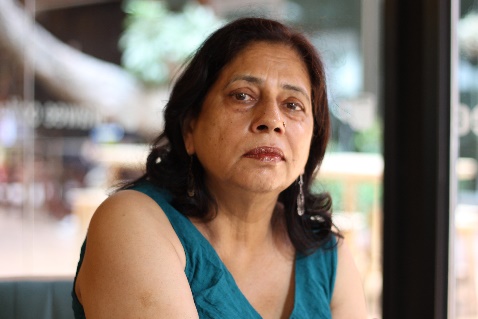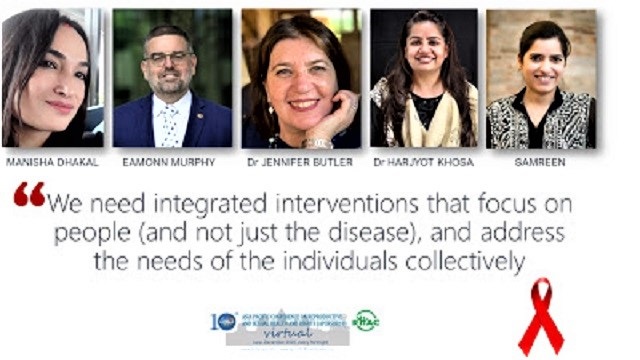


Solidarity and accountability are the hallmarks of tackling public health problems, as well as health emergencies. We need integrated interventions that focus on people (and not just the disease), and address the needs of the individuals collectively, urged Eamonn Murphy, Regional Director, UNAIDS, Asia and the Pacific.
Murphy was delivering the plenary address of twelfth virtual session of the 10th Asia Pacific Conference on Reproductive and Sexual Health and Rights (APCRSHR10), which is being held online this year because of the Covid-19 pandemic.
There has to be increased joint advocacy and joint programming to improve sexual and reproductive health and rights and control HIV/AIDS. We need to mobilize political (governmental) as well as community leadership to re-energize, he said.
Agrees Dr Jennifer Butler, Director of UNFPA Pacific sub-regional office based in Fiji, that community led approaches are of paramount importance to run their own services and to shape the services they receive. "In the HIV 'world' we knew this from very early on, and in the sexual and reproductive health and rights (SRHR) field it is becoming an increasingly critical mode of engagement. Access to sexual and reproductive health package of services and to HIV services has long been considered as basic right. But here we are in 2020, still arguing the case of HIV and sexual and reproductive health and rights integration. We are still looking at stigma, discrimination, exclusion; we are still looking at the need to continue to train healthcare workers to treat everybody with dignity they deserve", she said.
While access to quality healthcare services, whether for sexual and reproductive health, or for HIV/AIDS care, is very important, access alone cannot help shape responses. Not only is community engagement important but also community-led monitoring, to improve quality and regularity of appropriate HIV-related services.
Dr Harjyot Khosa, from YRG Centre for AIDS Research and Education, India, made a case for establishing community-led monitoring systems to engage communities on a regular basis to improve quality as well as accessibility of HIV-related services.
She gave the example of Community Score Card as one such systematic and sustained approach by engaging key populations to facilitate better health, improve HIV service delivery and overcome stigma and discrimination.
What is a Community Score Card?
It is a participatory tool to ensure accountability, transparency and responsiveness from service providers and improve quality and efficiency of services by receiving systematic feedback from the community as well as service providers. It empowers both - key population communities and service providers - and has proven to be a sustainable mechanism to monitor and record changes in quality and efficiency of services.
Dr Khosa shared the example of the Community Score Card for HIV affected communities developed and implemented by India HIV/AIDS Alliance under its 'Nirantar' programme. This Community Score Card has a set of 7 core indicators and sub-indicators on a range of issues, including quality of services, availability and accessibility of commodities/ services, forms of stigma and discrimination and attitudes of service care providers towards people living with HIV.
The community and healthcare providers conduct the scoring on each issue separately. Next, an interface meeting between the community members and the healthcare providers is held where the scores provided (on a scale of 0 to 10) by the healthcare providers and the community are reviewed to arrive at consensus scores and develop a mutually agreed action plan. Any score less than 4 warrants an action. They look at whether the problem is at healthcare provider level, HIV prevention programme level, government level or community level. Then an action plan is drawn whose outcomes are checked after 3 months in the next quarterly meeting. Heads of hospitals, healthcare providers, functionaries of targetted interventions and communities develop and resolve the action points during the interface meetings.
Under the abovementioned programme 72 community score cards were developed and 169 issues out of 230 were resolved till date.
Samreen, Human Rights and Advocacy Officer at Asia Pacific Transgender Network (APTN), and Manisha Dhakal, Executive Director of Blue Diamond Society, Nepal, appealed for integrating transgender health into HIV and sexual and reproductive health and rights programming, as the health needs of transgender community are still not recognized fully and they lack access to HIV and sexual and reproductive health related quality care.
They shared the findings of a community-based study, documenting the barriers faced by transgender women and transgender men in accessing HIV, sexual and reproductive health and rights and other healthcare services in Indonesia, Nepal, Thailand, and Vietnam.
While most respondents of the study had been tested for HIV, quite a few delayed seeking treatment, largely due to fear of discrimination by healthcare providers. Delaying treatment due to invasive questions was a stressor and reduced healthcare seeking behaviour. Respondents also reported that barriers to accessing health services were correlated with worse physical and mental health, and many of them exhibited severe symptoms of depression and anxiety.
The study clearly shows that transgender people's right to health is compromised across the Asia Pacific region. There are gaps in availability of sexual health services for transgender women and no services targeted at transgender men. Gender affirmative healthcare is limited and unregulated. Transgender people desperately need mental health support services. Stigma and discrimination limit transgender people's access to general healthcare services.
Rate of new HIV infections is not declining steeply enough
Sharing the latest HIV/AIDS data for the Asia Pacific Region, Eamonn Murphy said that a mere 12% decline in new HIV infections over the last decade is not reason enough to celebrate. Also there are wide variations between countries- new HIV infections declined by 81% in Singapore but rose by 207% in Philippines. AIDS-related deaths also declined overall by 29% in the region. While India recorded a whopping decline of 66%, Pakistan and Philippines saw a 4-fold and 3-fold increase in them over the same period. In 2019, 98% of the new infections were among key populations and their partners, with the most affected being the under 25 years old men who have sex with men.
"It (HIV infection) is rising amongst the young, and the most marginalised in societies are bearing the greatest impact, but that does not always attract the political leadership and support that is required to address these issues effectively. We see a focus very much on treatment but not so much on prevention so we have got the tap running while we are trying to empty the bowl underneath", said Murphy.
He also stressed upon the need to ensure the linkage between testing and treatment for those who test positive, and between testing and prevention for those who test negative for HIV. Another area of concern for both, HIV and sexual and reproductive health, is to get the young people to be able to access the services.
impact of Covid-19
Both HIV and sexual and reproductive health services have been affected by Covid-19, further widening the already existing faultlines. More than 80% of women living with HIV in Asia Pacific region reported that they lacked access to sexual and reproductive health services, including contraception, during covid-19 lockdowns. Transgender women reported difficulties in accessing hormone replacement therapy.
Young key populations of the region experienced disruptions when accessing condoms, Pre-Exposure Prophylaxis (PrEP), HIV testing and medication, mental health medication and psychological support.
Gender identity related stigma and discrimination also increased significantly during this time and amplified sexual and other forms of gender-based violence as well as violence against key populations by their families because people are spending a lot more time together in closed personal spaces.
Community solidarity and resilience in times of Covid-19
There are countless examples of how community solidarity has been at the forefront of doing their bit to maintain continuum of HIV care and service delivery, despite lockdowns. These include community-led innovations on differentiated service delivery, multi-month distribution of home antiretroviral (ARV) refill delivery and PrEP delivery service in Philippines; adapting service delivery to meet the needs for PrEP in Viet Nam; community ARV dispensing in India, Nepal, Papua New Guinea, Philippines, and Thailand; key population led PrEP service delivery in Thailand, to name a few. Regional community networks have also amplified the impact of these and other community-led responses.
However, such solidarity cannot be the sole responsibility of communities. Governments cannot absolve themselves from their responsibility to accelerate and sustain progress on every evidence-based intervention for HIV prevention, treatment, care and support. They also have no excuse to not invest fully for universal access to health through universal health coverage, which should be focussed not only on issues of health financing, but anchored in the right to health for everyone.
(Shobha Shukla is the award-winning founding Managing Editor of CNS (Citizen News Service) and is a feminist, health and development justice advocate. She is a former senior Physics faculty of Loreto Convent College and current Coordinator of Asia Pacific Media Network to end TB & tobacco and prevent NCDs (APCAT Media). Follow her on Twitter @shobha1shukla or read her writings here www.bit.ly/ShobhaShukla)